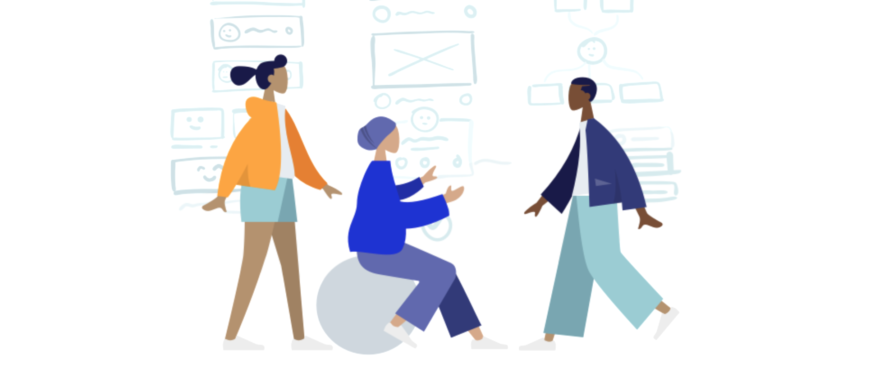During the recent inaugural online presentation for the Women in Technology Hollywood (WiTH) Knowledge Circles for Impact mentorship endeavor, Cybill Miklaszewski, WiTH foundation board member, said the initiative is offering group mentorship “circles” in data science, design and product, emerging technology, cybersecurity, and women in leadership.
The event’s keynote speaker was Davida Johnson, managing director of the UCLA Office of Advanced Research Computing, Data and Technology Solutions, who explained the challenges that women in technology continue to face and told viewers how they can break through those barriers.
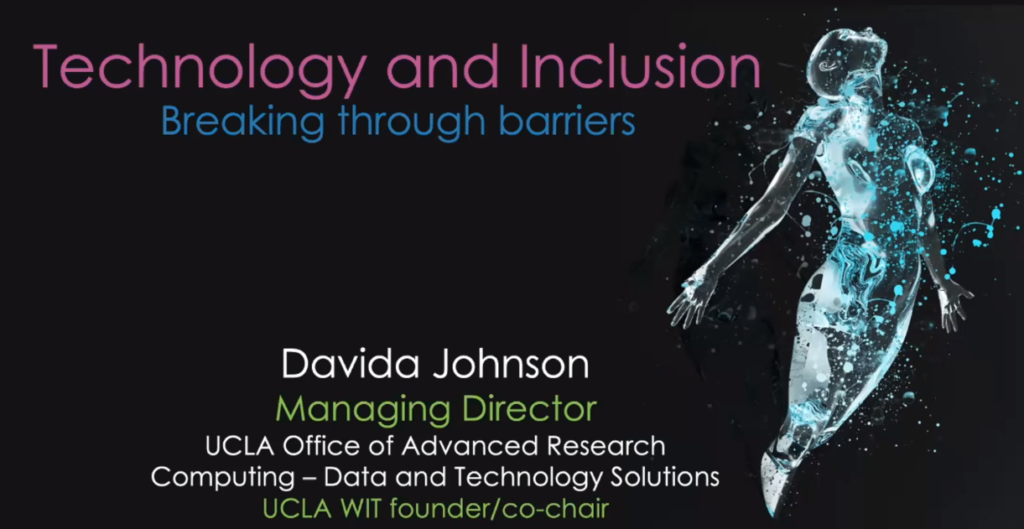 A Purpose-Driven Program
A Purpose-Driven Program
“Knowledge Circles for Impact is a purpose-driven group mentorship program that connects high-performing, diverse technologists with access and opportunity to find executive allies and advocates in media, entertainment and technology,” Miklaszewski explained.
“What I love most about group mentorship is the multi-directional opportunities to learn from all participants involved through shared experiences over the course of the program,” she said.
Miklaszewski told participants it’s important that those who sign up make the most of the opportunity. “Being present is really just about showing up and being free from distractions,” she said.
“We’ve taken a lot of time and been mindful at curating each circle to include all of your preferences, along with diversity across gender, age and industry so having an open mindset will be key to your experience,” she told participants.
“Being an introvert myself, I am typically not the first person to speak up in a group setting,” she conceded. “But I invite all the introverts to take this opportunity to develop your voice and share your thought leadership with your respective teams. And, for the extroverts out there, I so admire your courage and conviction you all have to share your thoughts. I ask that you expand on your superpower and also engage in some active listening with the entire team.”
The program is designed to “empower participants to positively impact their communities and workplaces by coming together and influencing change,” she explained, adding: “The hope is that, after this program is over, every participant feels elevated in knowledge gained and shares that knowledge in your respective communities…. The more tangible goal of this program is to provide leadership experience.”
For the program’s launch, “15 high-potential leaders across the industry were selected and are responsible for executing the vision of our esteemed senior executive mentors of the program,” she said.
“As we were designing this program, we felt very strongly about providing a work experience that may not otherwise be possible in… current work roles,” she pointed out.
“None of this would be possible without the collective talents of our Founder’s Circle,” she went on to tell viewers, adding: “With all of the challenges of 2020, we came together to create this program as an anchor of hope and possibility in shaping the future of media, entertainment and technology.”
WiTH is already looking ahead for the next version of the program. “Later this year, we will be recruiting for additional Circle leads for the next iteration of the program as we plan to expand our reach so stay tuned there,” Miklaszewski said.
Breaking Through Barriers
During the keynote, called “Technology and Inclusion: Breaking through Barriers,” Johnson told viewers: “I had to remind myself: Why did I choose a career in technology?”
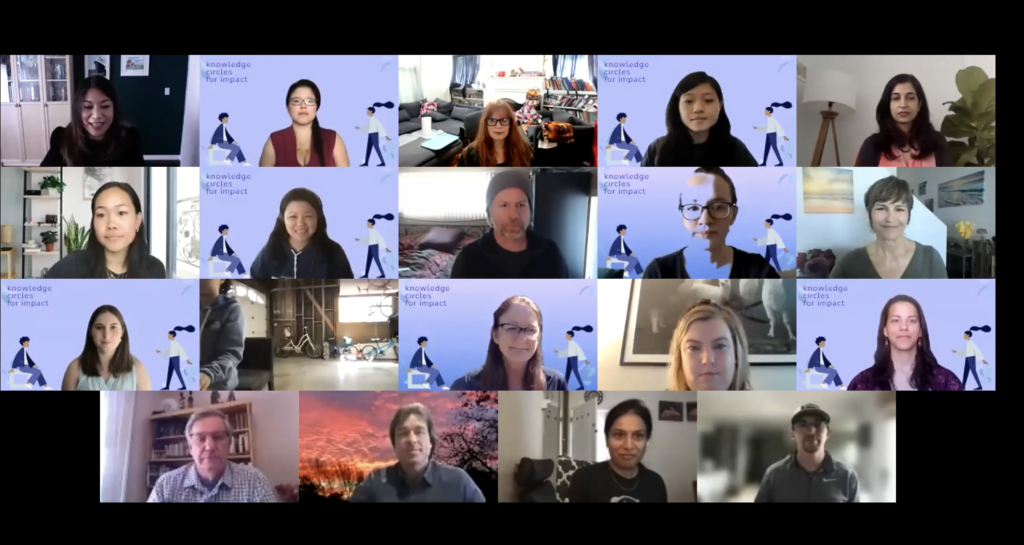 There are a lot of benefits to a tech career and “one is [it’s] a satisfying career,” she said. There is also “high earning potential, we are always involved in some form of innovation and shaping innovation, [and] there’s unlimited applications of technology,” she noted.
There are a lot of benefits to a tech career and “one is [it’s] a satisfying career,” she said. There is also “high earning potential, we are always involved in some form of innovation and shaping innovation, [and] there’s unlimited applications of technology,” she noted.
Additionally, in the tech sector, “our skills are portable and transferable,” she said, explaining: “The things that we learn we tend to be able to uproot those and apply them to different projects or different companies and organizations.”
Other positives of a tech career: “We have a rich and diverse network of colleagues and peers around the globe. We have a lot in common being in technology. And I’ve read recently, it improves our cognitive functions” also, she said.
However, “a funny thing happened on my way to a satisfying career,” she told viewers, noting, “I ran into some barriers and I’m sure that you will recognize some of these barriers.”
She was a programmer in her first tech job. But “there is a cultural crisis out there and I was the only female for many years,” Johnson told viewers. So the career “does come with some cultural issues and baggage,” she noted.
And although there is high earning potential in tech, there are “equity issues” for women and “we’re constantly fighting” so that women can “make as much in the same roles as our male counterparts,” she said.
When it comes to “shaping society,” meanwhile, “there is a constant need for us to continue to train and learn and develop, and when are we going to do that?” she asked. After all, she explained: “We have so many other things to balance…. It is a challenge for us and it could be a barrier for us to continue to move forward.”
Although there are “unlimited applications of technology,” she asked, “Why are we always having to prove ourselves to take on bolder projects? There are not as many women that we meet in these leadership roles and we also need to balance work and home.”
It is also great that tech skills are portable but she asked, “Where are the opportunities? Where can we go for those opportunities? How do we get those opportunities to open up for us?”
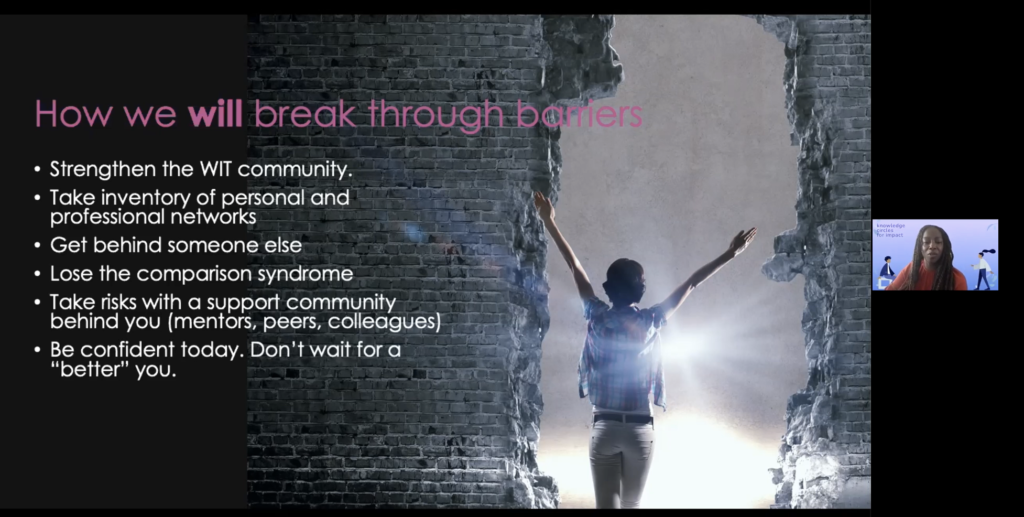 Although there is a rich network in the tech sector, she asked, “When do we go to a conference or a fair where we see more representation with women and ethnic minorities? We really want to see that increasing.”
Although there is a rich network in the tech sector, she asked, “When do we go to a conference or a fair where we see more representation with women and ethnic minorities? We really want to see that increasing.”
Last, although cognitive functions may be improved by a tech career, “all of these barriers increases stress,” so it would be good to “nullify the downside of all these barriers,” she told participants.
Citing data from a 2018 UCLA survey of about 250 women in tech, she said their number one need was more career growth, with 47% of respondents citing that. Also cited by them were stronger sponsorship for leadership positions, education/training, better work culture and salary improvement, she noted.
And, since 2018, “these things have not changed,” she said. “We continue to be people who are constantly fighting for these things in our lives.”
The good news, however, is “there are opportunities to make change,” she said. But “I think we do need to challenge ourselves more” when it comes to value propositions, she noted.
When it comes to inclusion, “diverse teams should always be the norm,” she said, adding: “We should be a society who believes in equity and that should be the norm. That actually should be our new standard.”
When it comes to breaking through barriers, “there are opportunities for us to cause change,” she said.
There are several things that women and others can do to help women break through the barriers, she pointed out:
- Strengthen the women in technology community – and mentorship programs like this help.
- Male and female advocates for women should take an inventory of your personal and professional networks.
- Get behind other women and support them, even in situations where you don’t necessarily agree with them-“Get behind them with help, with honesty, with truth and also with grace.”
- “Lose the comparison syndrome,” which she conceded is “hard” but worth doing. It is important to focus on what we want.
- Take risks with a support community behind you (mentors, peers and colleagues).
- “Be confident today. Don’t wait for a ‘better’ you.”
- Go get educated to offer value to others.
Her love for tech is what most inspires here to continue in the field despite any barriers she faces, she went on to say during the Q&A.
“I may change positions, change jobs or change direction but I won’t change my dream…. I feel like I belong here and I belong in technology, and it’s too late for someone to convince me otherwise. And so this is what I choose and no one can really stop me at this point in my life,” she concluded.
More ‘Circle’ Program Details
Each mentorship circle promises to offer those who join the opportunity to learn from peers, and grow their networking and professional development skills.
Each circle will meet periodically over a six-month period, with group leaders determining the frequency and length of meetings, averaging a minimum of an hour a month. Circles are rotated bi-annually to offer those in the program the opportunity to learn new areas of expertise.
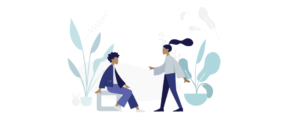 Here’s a look at what each knowledge circle entails, and who’s involved:
Here’s a look at what each knowledge circle entails, and who’s involved:
- Data Science: This circle will gather data science, machine learning and other technical specialists to explore best practices and innovate new solutions in media and entertainment. Mentors include Jin Kang, practice leader, AI/ML and analytics professional services, Amazon Web Services; and Parker Lowrey, VP of data, Whip Media Group. Participants must have at least five years’ work experience in data science or analytics related field, technology or technology adjacent, or possess an advanced degree in mathematics, statistics, or data science.
- Design & Product: This circle will explore the process of imagining, creating, and iterating products that solve users’ problems or address specific needs. Mentors include John Solaro, VP of design UX and product innovation for The Walt Disney Co., and MacBeth Watson, VP of design and research for Strava. Participants must have at least five years’ work experience in design related fields, product management or technology related fields.
- Emerging Technology: This circle will focus on various topics in emerging technology available to revolutionize the entertainment industry such as blockchain, AR/VR, 3D and game engines, and 5G and IoT. Mentors include Eric Iverson, CTO of the global M&E vertical for Amazon Web Services; Alice Taylor, VP of content innovation and StudioLAB for The Walt Disney Studios; and Gretchen Libby, director of visual computing, GTM, for Amazon Web Services. Participants must have at least five years’ work experience in M&E technology related fields.
- Cybersecurity: This circle will explore the body of technologies, processes, and practices designed to protect networks, devices, programs, and data from attack, damage, or unauthorized access. Mentors include Melody Hildebrandt, EVP of product and engineering and CISO for Fox Corp., and Steve Tran, CISO, MGM. Participants of this group must have at least two years’ work experience in cybersecurity or five years’ work experience in technology or technology adjacent fields
- Women in Leadership: This circle will help turn obstacles into opportunities on how to act with power, navigate the workplace, and take the lead with new strategies and tactics you can leverage throughout your career. Mentors include Nancy Faginas Cody, former SVP of IT enterprise business systems for The Walt Disney Co.; Vicky Colf, CTO of Warner Bros.; Erin Griffin, senior executive partner with Gartner; and Melanie Hildebrandt Harrison, SVP of corporate IT for Sony. Participants must have at least 10 years’ work experience in technology related fields in media and entertainment. Manager level minimum. This circle is meant for those who identify as female.
For more information about the program, click here. To view the unveiling presentation, click here.

